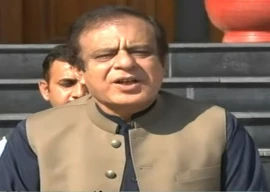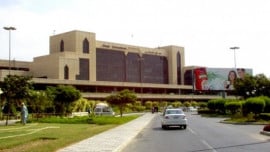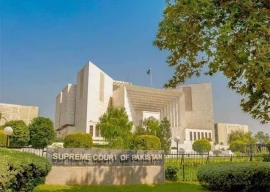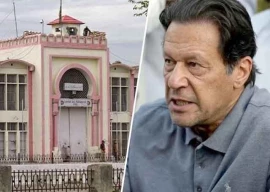
ISLAMABAD:
Chief Justice Iftikhar Muhammad Chaudhary has asked the government to empower the Supreme Court to revisit the death by hanging verdict handed down to Zulfiqar Ali Bhutto.
“You must provide us the jurisdiction so that we can derive our powers to give our opinion on the presidential reference in accordance with Article 186 of the constitution,” the CJ remarked during the hearing.
Federation’s counsel Babar Awan asked the eleven-member bench to interpret Article 186 in a broader context. The court asked Awan to come to the question of law asked by the president in the reference.
Awan contended that the due process mentioned in Articles 4 and 9 of the constitution were violated which guarantee the inalienable right of every citizen to enjoy the protection of law and to be treated in accordance with it.
Justice Sair Ali said history is witness to the popular verdict which overarches the court’s judgment. The counsel contended that it is the courts’ prerogative to pronounce a verdict. He cited different references from Pakistani and Indian jurisdictions.
The bench asked him to quote a judgment from anywhere in the world where a case was reopened after the dismissal of the review. Babar quoted the Roopa case in which the Indian Supreme Court declared that justice is more important than meeting the finality of the judgment.
Former Lahore High Court (LHC) chief justice Maulvi Mushtaq gave no reason for transferring Bhutto’s case from the session court to the LHC. He said it was important to highlight the flaws in judicial proceedings during the martial law regime.
The CJ asked if the cases of all the people executed during martial law should be reopened. The counsel argued that the case of Bhutto was different because he was the only one to hang for complicity in a murder case. A day before the hearing of Bhutto’s appeal in the Supreme Court, Ziaul Haq removed chief justice Muhammad Yaqub Ali.
The CJ remarked that discrimination in Bhutto’s case was unprecedented in the history of law. The case was adjourned till Thursday.
Meanwhile the fate of some 29 parliamentarians, who won by-elections, hangs in the balance after the Supreme Court questioned the polls’ validity on the grounds that the election commission (EC) has not been constituted according to the 18th amendment.
The CJ questioned how the ECP conducted the elections when it is a violation of Articles 218 and 219. By-elections held after April 20, 2010 are unconstitutional. Deviation from the constitution amounts to high treason.
The AGP informed the court that the names proposed for the new chief election commissioner have been sent to the Prime Minister and the leader of house. The membership of these parliamentarians may be terminated, the CJ observed.
“What is the legality of their acts under the circumstances? He said this case would lead to another constitutional crisis.”
Shah Khawar requested the court to grant the ECP immunity from litigation until it has been duly constituted.
“Do you want us to revert to the doctrine of necessity? We are under oath to work in accordance with the constitution,” the CJ remarked. He directed the ECP to submit a reply on the status of by-elections till May 19 and asked the AGP to come up with a solution as this case is of immense constitutional importance.
Published in The Express Tribune, May 12th, 2011.



























































COMMENTS (1)
Comments are moderated and generally will be posted if they are on-topic and not abusive.
For more information, please see our Comments FAQ